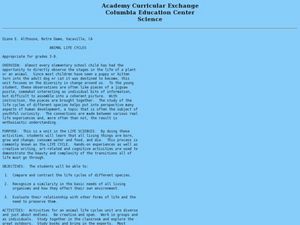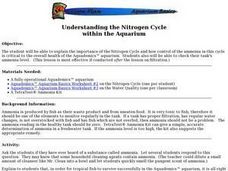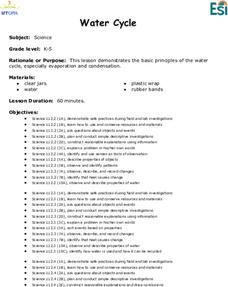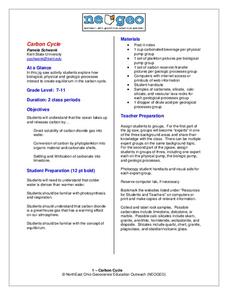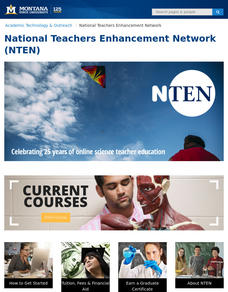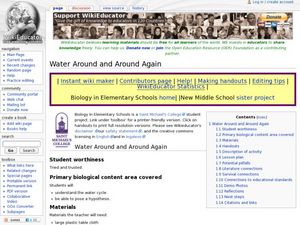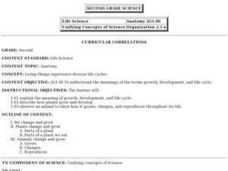Curated OER
Rock Cycles, Crayon Cycles
Students examine the rock cycle and the path that rocks go through to rearranged in different ways. They define key vocabulary terms, then in small groups conduct a variety of experiments using crayon shavings as simulated rocks and...
Curated OER
Animal Life Cycle
Students conduct hands-on experiments. In this life cycle instructional activity, students are able to observe a variety of animals as they travel through their life cycle (brine shrimp, mealworms, frog eggs and chicken eggs). Students...
Curated OER
Understanding the Nitrogen Cycle within the Aquarium
Young scholars discuss ammonia, and ways it may get into the aquarium. They complete a worksheet about the Nitrogen Cycle. Students learn how to get the ammonia and nitrite out of their aquarium.
Curated OER
Ecology
Students make connections between their daily lives and the usage of natural resources as they relate to the importance of environmental quality. In this ecology lesson, students listen to the story The Lorax by Dr. Seuss and then...
Curated OER
Testing Your Water
Students perform several water quality tests on groundwater from their area. They use test strips to determine the pH, hardness, alkalinity, nitrates, iron and chloride levels.
Curated OER
Life Cycle - Human Biology
In this life cycle worksheet, 9th graders complete 3 different procedures that distinguish viruses and bacteria and inherited characteristics. First, they read the background excerpt given about bacteria and viruses. Then, students cut...
Curated OER
Miniature Water Cycles
Students construct a model of the water cycle in action using two-liter pop bottles to build a terrarium. Locate examples of evaporation and condensation in the water cycle (e.g., water evaporates when heated and clouds or dew forms when...
Curated OER
Water Cycle: Weather Lesson 1
First graders go on a water walk, collect weather data, and measure rainfall for a month. They examine the water cycle in this series of lessons.
Curated OER
Water Cycle
Students perform experiments with water to observe the principles of evaporation and condensation. They make models of the water cycle and discuss the processes that occurred in their experiments with their jars of water.
Curated OER
Parasite Development and Life Cycle
If you are new to teaching agriculture classes, this outline may be helpful when you are preparing a lecture on parasites in livestock. In addition to lecturing on this topic, the lesson plan suggests that learners research the life...
NorthEast Ohio Geoscience Education Outreach
Carbon Cycle
Using a jigsaw approach, earth science experts teach each other about the physical, biological, and geologic components of the carbon cycle, with a specific focus on the ocean.
Curated OER
In the Rain Shadow
Young scholars charts the rainfall averages on either side of a mountain range. In this water cycle lesson, students discover that mountain ranges affect weather patterns. Young scholars pretend they are air traffic controllers and must...
Curated OER
Weather Jeopardy
Future meteorologists play a Jeopardy game to review vocabulary and concepts taught during a weather unit. Questions cover such topics as weather vocabulary, tornado safety, the water cycle, and cloud types are part of this review.
Curated OER
Water and Ice
Students observe what happens to water as it goes from a solid to a liquid. In this exploratory lesson plan students gain an understanding for the water cycle while working in groups observing what happens to water as it changes state.
Curated OER
Water as a Cycle
Students collaborate with a partner to create a large diagram containing one aspect of the water cycle. They are encouraged to include academic language and pictures for their presentation. Their is a peer evaluation sheet that is...
Curated OER
The Water Cycle
Students create an "animated" water cycle wheel that illustrates where water comes from and where it goes.
Curated OER
Water Quality
Students investigate the water cycle and evaporation. They study the porosity and permeability of groundwater, and the capillary action in soil in this unit.
Curated OER
Water Around and Around Again
Young scholars form a hypothesis for a water cycle experiment. In this water cycle lesson plan, students create their own environment with water and earth to study the water cycle. Young scholars complete a handout to make a hypothesis...
Curated OER
Water World Story
Fourth graders write a story about how a drop of water may have traveled to school. They design a presentation on the water cycle.
Curated OER
The Case of the Missing Water
Students examine the major concepts related to the water cycle in this lesson. They recognize and define evaporation, condensation, precipitation and the natural cycles that occur as weather. They also participate in an activity of...
Curated OER
Water Supply
Fourth graders explore weather patterns by completing an Internet project. In this water cycle lesson, 4th graders read assigned text including a Magic School Bus book about precipitation and water. Students complete a water science...
Curated OER
Transpiration
Students explain the function of the hydrologic cycle and demonstrate how transpiration rates can be experimentally changed.
Curated OER
Analyzing the Relationship between Snowpack and River Flow
Young scholars use the Internet to research current and past snowpack levels and river gauging station readings. They determine the relationship between snowpack and river flow. They predict future river flow.
Curated OER
Living Things Experience Diverse Life Cycles
Second graders will study and explain the meaning of growth, development, and life cycle. They describe how plants grow and develop and observe an animal to show how it grows, changes, and reproduces throughout its life.
Other popular searches
- Water Cycle Diagram
- The Water Cycle
- Water Cycle Experiment
- Water Cycle Activities
- Water Cycle Stages
- Water Cycle Crossword
- Water Cycle Lesson Plans
- Water Cycle Reader's Theater
- Water Cycle and Evaporation
- Water Cycle Diagram Label
- Water Cycle Simulation
- Build Your Own Water Cycle



